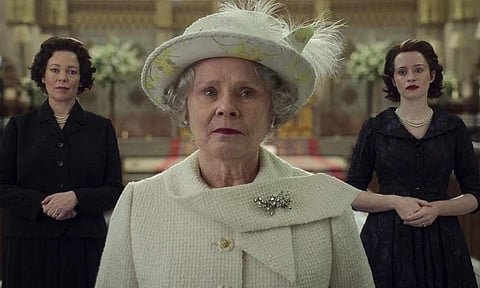The Crown S6 Finale Series Review: Detailed episodes get cut short by a rushed ending
Rating:(3 / 5)
After seven years, the curtains are finally drawn to a close for the Netflix British drama The Crown. As the finale episode cuts to a blank screen, it is quite evident that the series solely banked on two women to explain the British monarchy through six seasons — Queen Elizabeth II, and Princess Diana — with other characters just acting as pawns to throw light on the royal women. The final batch of episodes is not devoid of Diana’s presence as her memories and mentions come to haunt her sons, William and Harry who now have to face the media who chase after them like hawks, but the series delightfully takes one episode at a time to recreate poignant points from the British royalty in modern-day England.
This set of episodes is about Tony Blair's reign as the Prime Minister, the young princes coping up with their mother's untimely demise, and Prince Charles finally tying the knot with Camilla Parker-Bowles. The makers stage these instances amid an overarching screenplay that cleverly knows how to entwine occasions to the major ones that happen later. Among the young royals, it is Prince William and his courtship with his present wife Kate Middleton, which began when both of them attended St Andrews, that takes centre stage. But again, it isn't elaborate enough as we are relegated to seeing it as a campus love story.
Cast: Imelda Staunton, Dominic West, Meg Bellamy, Ed McVey, among others
Streaming on Netflix
No, we don’t see the royal wedding happening or Kate getting accustomed to royalty, but in return, there are challenges that the British Empire is thrown at, like reconsiderations of remarriage, and rules of primogeniture. There is also a sleek segment of tabloids flashing Prince Harry’s Nazi symbol after he wore the costume to a party. As these segments get a brief space, we see Claire Foy and Olivia Colman make a return as Elizabeth. Their portrayal of inner voices that Imelda Staunton’s Queen reflects upon is cathartic, meditative, and somewhere confides the struggles of inner conflict. The scenes are staged cleverly, and the three actors flawlessly and unabashedly, not to forget delightfully, light up the scenes with their acting prowess. Thankfully, mistakes that happened during the attempts to bring back Diana in the form of apparitions are carefully skipped in the Queen’s recreations.
The Crown does not end the way we think it would. It is up to debate why the creators chose to mark this point as the series ender, especially given that Queen Elizabeth II, the longest-serving British monarch, is no more. But melancholy and emotional drama surround the palace walls when the show makes a remarkable choice of showing us the instance when the Queen makes the palace bagpiper play Sleep Dearie Sleep, before ultimately making it her funeral song. It is also a cleverly lit and constructed cinematography that ends in a scene of Elizabeth walking alone, exiting the door. It gives rise to multiple interpretations; one where she and only she knew the baggage of the crown that weighed upon her, and how she was solely exposed to the criticism and reprimands the authority the Crown got over several decades. In the total of six seasons, Queen Elizabeth II, who never shied or backed down from the royal duties ever since she assumed it at the mere age of 25, gets mildly startled when Philip mentions planning Operation London Bridge. It is a poignant time where we see the person Elizabeth rather than the one taking the onus of the jeweled headgear.
If you think The Crown will be detailing every turning point of the British Empire up until now, you are in for massive disappointment. Of course, the show spares segments for the demise of Queen Mother and Princess Margaret. But the series only hints at the growing outrage and distance Prince Harry felt over time until his official giving up of duties along with his wife Meghan Markle. But despite a barrage of shortcomings, The Crown does one thing right. It reiterates the life and conflict of the woman whose sovereign lasted for decades amid turmoil and political correctness of sinister colonialism. The Crown is indeed a symbol of “permanence and continuity” and the one who takes it up ends up being a person with loneliness lingering around.

